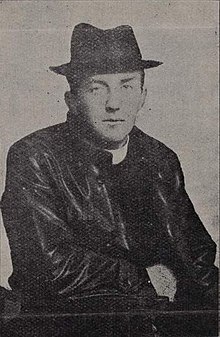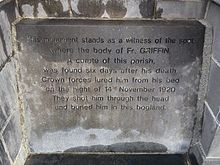Michael Griffin (Irish priest)
This article uses bare URLs, which may be threatened by link rot. (May 2021) |
Father Michael Griffin | |
|---|---|
 | |
| Born | Michael Griffin 18 September 1892 Gurteen, East Galway |
| Died | 14 November 1920 (aged 28) Bearna, Galway |
| Nationality | Irish |
| Occupation | Roman Catholic Priest |
| Known for | Believed killed by British Black and Tans. |
Father Michael Griffin (18 September 1892 – 14 November 1920) was an Irish Catholic priest.
Griffin was born in the townland of Gurteen, County Galway, to Thomas George Griffin, a farmer, and Mary Coyne (also Kyne).[1] In the 1901[2] and 1911[3] censuses, the family was recorded as living in the neighbouring townland of Gortnacross. Griffin's father was chairman of Galway County Council when he died in 1914, having been associated with the Land League, Parnell, and was imprisoned for his activities in the 1880s.[4]
Griffin was ordained at St Patrick's College, Maynooth in 1917. A priest of the Diocese of Clonfert, he served in the Diocese of Galway, Kilmacduagh and Kilfenora. In June 1918, the curate was transferred from the parish of Ennistymon, County Clare, to Rahoon, Galway City.[citation needed]

On the night of 14 November 1920, during the Irish War for Independence, Griffin, a known Irish republican sympathiser, was taken from his home at 2 Montpellier Terrace and taken to , where he was questioned. On 20 November, his body was found in an unmarked grave in a bog at Cloghscoltia near Barna;[5] he had been shot through the head.[6][7][8] On 23 November, after Griffin's funeral mass at St Joseph's, the funeral cortege took place through the streets of Galway. Three bishops, 150 priests and in excess of 12,000 mourners participated. The priest was buried in the grounds of Loughrea Cathedral.[9]
A group of enthusiasts gathered together in Galway in the spring of 1948 to form a football club and they decided unanimously to name the club "Father Griffins". There is also a road in Galway City called "Father Griffin Road".[10]
See also[]
References[]
- ^ "General Registrar's Office". IrishGenealogy.ie. Retrieved 17 April 2017.
- ^ "National Archives: Census of Ireland 1901". www.census.nationalarchives.ie. Retrieved 17 April 2017.
- ^ "National Archives: Census of Ireland 1911". www.census.nationalarchives.ie. Retrieved 17 April 2017.
- ^ "Notable Galway man dead". Irish Independent. 2 April 1914. p. 4. Retrieved 17 April 2017.
- ^ http://www.bureauofmilitaryhistory.ie/reels/bmh/BMH.WS1729.pdf#page=10
- ^ Reference to Father Griffin, ouririshheritage.org; accessed 1 October 2014.
- ^ Murder of Father Michael Griffin, theauxiliaries.com; accessed 1 October 2014.
- ^ Leeson, D. M. (2011). The Black and Tans: British Police and Auxiliaries in the Irish War of Independence, 1920-1921. Oxford University Press. p. 52. ISBN 978-0-19-959899-1.
- ^ "Father Griffin's Remains Taken to Loughrea — Impressive Church Scenes — All Classes Horrified at the Awful Crime", Galway Observer, 27 November 1920.
- ^ https://maps.google.com/maps/ms?ie=UTF8&hq=&hnear=16+Seamount,+Galway,+County+Galway,+Ireland&t=h&oe=UTF8&msa=0&msid=201548600520739669116.00000112b98eb2337d96d&dg=feature
Further reading[]
This section lacks ISBNs for the books listed in it. (October 2014) |
- Lady Gregory's Journal, v. 1. Books 1-29: 10 October 1916 – 24 February 1925; 1978; ISBN 0-900675-92-6
- Athenry: A Local History (1850–1983), Aggie Qualter, 1984.
- Athenry: A Brief History and Guide, Ann Healy, 1989.
- The Lamberts of Athenry, ed. Finnbarr O'Regan, Galway, 1999.
- The Fields of Athenry, James Charles Roy, 2001.
- 1892 births
- 1920 deaths
- Alumni of St Patrick's College, Maynooth
- British war crimes during the Irish War of Independence
- Deaths by firearm in Ireland
- 20th-century Irish Roman Catholic priests
- People from County Galway
- People killed in the Irish War of Independence
- People murdered in Ireland
- Unsolved murders in Ireland
- 1920s murders in Ireland
- 1920 murders in Europe
- 1920 crimes in Ireland